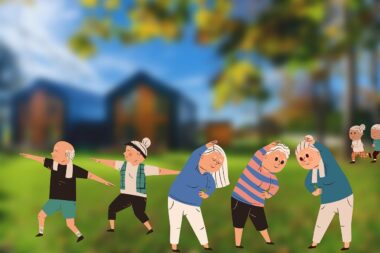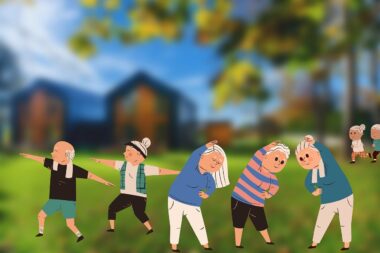Swimming for Seniors: Low-Impact Fitness Benefits
Swimming offers numerous benefits for seniors seeking low-impact fitness routines. As a gentle form of exercise, swimming minimizes stress on joints while providing an effective way to improve cardiovascular fitness and muscle strength. The buoyancy of water supports the body, reducing the risk of injury and facilitating movements that may be difficult on land. With the ability to adjust the intensity and duration of workouts, swimming is accessible to individuals of varying fitness levels. Additionally, regular swimming sessions can enhance flexibility and balance, critical aspects for seniors aiming to maintain their independence and mobility. Engaging in a workout routine that includes water-based activities can contribute to overall well-being and happiness, encouraging seniors to stay active and social. It’s also a great way to combat issues such as arthritis and joint discomfort. Therefore, seniors looking for a sustainable fitness option might find swimming particularly beneficial. Many community pools offer classes specifically designed for older adults, ensuring a comfortable and encouraging environment to exercise. Seniors should consult with healthcare providers before starting any new exercise program.
Swimming can be particularly advantageous for mental health among seniors. As individuals age, maintaining emotional well-being becomes increasingly important. Engaging in regular swimming can alleviate feelings of anxiety and depression. The rhythmic nature of swimming, combined with the soothing effects of water, often leads to a meditative state that can promote relaxation. It allows seniors to focus on their movements and breathe deeply, reducing stress levels. Furthermore, swimming can facilitate social interaction, thereby combating loneliness often experienced by older adults. Joining a swim class or simply sharing pool time with others leads to meaningful connections. These social interactions support psychological health, contributing to a more positive outlook on life. Physical activity, such as swimming, also releases endorphins which enhance mood. By building a routine involving swimming, seniors not only commit to physical improvements but also support their mental well-being. Bringing together these elements makes swimming exceptionally valuable for the aging population. This holistic benefit underscores why swimming is a popular choice among seniors eager to maintain an active lifestyle. The community aspect of swimming pools can create a sense of belonging and camaraderie.
Enhancing Physical Abilities through Swimming
Another advantage of swimming for seniors is its positive impact on physical abilities. Swimming enhances endurance and strength through varied strokes, from freestyle to backstroke and breaststroke. These diverse movements engage different muscle groups, promoting better physical health overall. With enhanced strength, seniors can perform daily activities with greater ease and reduced discomfort. Regular swimming sessions gradually increase cardiovascular endurance, helping seniors maintain an active lifestyle. Improved endurance also facilitates participation in other physical activities, like walking or hiking. Additionally, swimming fosters an environment for better coordination and balance as seniors must navigate through the water. This skill directly transferrs to land-based movements, reducing the risk of falls and other injuries. Seniors can steadily build their workout intensity according to their comfort levels, ensuring safe progress. Community centers often provide programs tailored specifically for seniors, helping them feel welcomed and supported as they swim. Additionally, participating in group swim sessions encourages involvement, enhancing motivation to stick to a fitness routine. In essence, swimming serves as a sustainable avenue for seniors to enhance their overall physical abilities and quality of life.
Furthermore, swimming is an adaptable exercise option, accommodating varying preferences and abilities among seniors. This flexibility allows individuals to tailor their swimming experience, ensuring it meets their needs and interests. Whether it’s swimming laps, participating in water aerobics, or enjoying leisurely floats, seniors have choices to engage in the water. Engaging in activities that they enjoy is crucial for adherence to fitness regimens, as seniors are more likely to stick with an exercise routine that brings them joy. Many facilities also offer specialized senior-focused classes to develop water skills, catering to those unfamiliar with swimming techniques. Thus, each swimmer can progress at their own pace while enjoying the camaraderie of fellow participants. In addition to enjoyment, swimming sessions also help maintain crucial mobility as seniors rely on diverse movements. This continued mobility translates into maintaining independence, which is paramount for many older adults. Facilities equipped with pools designed for seniors often have accessibility features, making it easier for everyone to partake. These features reduce barriers that might otherwise deter an older individual from enjoying the health benefits of aquatic exercise, proving that swimming can be both practical and pleasurable.
Long-Term Health Benefits of Swimming
Persistence in swimming leads to long-term health benefits that can significantly enhance quality of life for seniors. Regular aquatic exercise can mitigate chronic health conditions, such as heart disease and diabetes, by improving blood circulation and maintaining healthy weight levels. Additionally, swimming supports the development of healthy lungs and boosts respiratory function through controlled breathing exercises. These benefits not only help manage existing health issues but also prevent new ones from arising. Weight management is crucial in helping seniors maintain mobility and reduce strain on joints, ultimately improving overall wellness. Research suggests that seniors who incorporate low-impact exercises like swimming into their routines are less likely to experience functional decline. Furthermore, swimming as a low-impact workout can help manage symptoms of arthritis and promote joint flexibility. Participating in aquatic exercise can, therefore, enhance seniors’ chances of staying active and independent for longer periods. With regular training, vital bodily systems improve, reducing the likelihood of hospitalization and associated stress. Senior swim teams can become social support systems, fostering friendships that encourage regular exercise and help overturn isolation often felt during aging. As a holistic approach to fitness, swimming checks all the essential boxes for elder care.
In addition to physical and mental benefits, swimming encourages a healthier lifestyle for seniors outside the pool. This increase in physical activity often translates to better nutrition and daily habits. Being active fosters an increased desire for healthy eating, as individuals recognize the need to fuel their bodies properly. Consequently, swimming can lead to increased awareness of overall wellness, as seniors may become more mindful of their eating patterns and hydration levels. Healthy eating habits can further improve physical performance in the water, creating a positive feedback loop. Furthermore, engaging regularly in swimming can foster a sense of accomplishment, crucial in motivating seniors to maintain healthy routines. The exhilarating sensation of swimming through water acts as a refreshing break from daily routines, injecting joy within the lives of older adults. Aquatic sessions can often replace sedentary activities with vibrant social exchanges and opportunities for engagement. As they flourish both mentally and physically, seniors tend to inspire each other to adopt this healthier lifestyle. These holistic improvements exemplify the interconnected effects of swimming, encouraging elders to cherish both their swimming sessions and healthier lifestyle choices.
Conclusion: Embracing Aquatic Activities
Swimming emerges as an excellent form of low-impact exercise, particularly well-suited for the elderly population. The multifaceted benefits it offers encompass not only physical gains but also psychological well-being and social interactions. With its gentle approach, swimming promotes wellness for seniors while encouraging a vibrant and active lifestyle. The adaptability of swimming makes it accessible regardless of fitness levels, allowing older adults to find enjoyment in this age-friendly exercise. As seniors experience the invigorating effects of swimming, many discover enhanced mobility, strength, and resilience. Participating in swim programs routinely fosters community connections that uplift spirits and cultivate friendships. Thus, swimming offers an enjoyable way for older adults to create a supportive social network while prioritizing their health. Through engaging in aquatic exercise, seniors can achieve overall wellness goals, ensuring long-lasting quality of life. Whether through therapeutic water exercises or lively recreational swimming, the importance of water-based activities cannot be overstated for active aging. By embracing swimming, seniors can turn back the clock in spirit, energy, and motivation as they embark on an exciting journey of fitness.
As their bodies remain in motion, swimming delivers powerful effects throughout their lives. This enduring form of exercise can empower seniors, giving them a sense of achievement and fulfillment as they dive into a healthier lifestyle.





